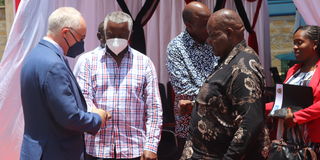Homa Bay to fund war on HIV after donors withdraw

Homa Bay County Governor Cyprian Awiti and his deputy Hamilton Orata converse with Centre for Disease Control (CDC) country Director Marc Bulterys after signing a memorandum of understanding on the transition of HIV management from donor funding to County government support on April 6,2022.
The Homa Bay County government will for the first time in the history of devolution set aside funds in its budget to fight the spread of HIV.
It follows the scaling down of operations by donors who have been supporting prevention initiatives.
The devolved unit will use part of its annual budget from the 2022/2023 financial year onwards to ensure a smooth transition from donor-funded HIV services.
Homa Bay leads Kenya in HIV prevalence at 18.6 per cent, down from 26 per cent in 2013.
Since the inception of devolution, donor-funded organisations have been supporting the fight against the sexually transmitted disease including hiring healthcare workers.
The organisations also collaborate with the national government in purchasing and distributing antiretroviral drugs (ARVs) and tracing drug defaulters, among other activities, through a programme funded by the US President's Emergency Plan for Aids Relief (Pepfar).
Over the years, support from organisations such as the Elizabeth Glaser Paediatric Aids Foundation and Liverpool VCT has helped lower the HIV prevalence rate.
The Ministry of Health says HIV deaths in Homa Bay have reduced by 42 per cent, with the infant infection rate declining from 13 per cent in 2013 to 3 per cent today.
Mother-to-child transmission rates have also dropped from 16 per cent nine years ago to eight per cent in 2022.
Donor-funded organisations have now started reducing their support after infection rates started declining.
This means Homa Bay will manage the disease on its own by setting aside funds for combating HIV.
It will become the first county to start managing the disease singlehandedly.
Governor Cyprian Awiti said that besides HIV, donors have helped his administration fight tuberculosis (TB).
He said it is time for the county government to take over managing the diseases because they are no longer a threat as they were 10 years ago.
"It is time to put together a budget for the fight against HIV and TB in the county. We are soon taking over the management of these diseases and we are optimistic that we shall overcome them," Mr Awiti said.
MoU with CDC
He spoke when the county government signed a memorandum of understanding with the US Centres for Disease Control (CDC) about the transition from Pepfar funding.
The CDC funds the fight against HIV and other diseases in the county by supporting the organisations.
Mr Awiti’s administration has already rolled out a programme where HIV patients get direct support from the devolved unit and not from donor-funded organisations.
The programme, Ngima Mogen (life of hope), is being implemented in Kodera in Rachuonyo South sub-county.
It is a pilot programme meant to gauge the county government's ability to manage HIV on its own.
Governor Awiti commended CDC for the support offered to his government in the past 10 years and pledged to continue working with other organisations to further reduce HIV infections.
Country CDC Director Dr Marc Bulterys pledged to work with Homa Bay in making HIV and TB programmes sustainable.
But the transition to county funding of HIV programmes will increase the county government’s financial burden.
Mr Awiti's administration is already heaving under a huge wage bill, with half of the money allocated by the national government used to pay salaries.
Much of the rest is spent on other recurrent expenditure.
Mr Awiti said health consumes the largest share of the county budget, Sh2 billion.
"We need to adjust the health budget to include HIV management. With continuous support from other partners, we will be able to eliminate the issues," the governor said.





